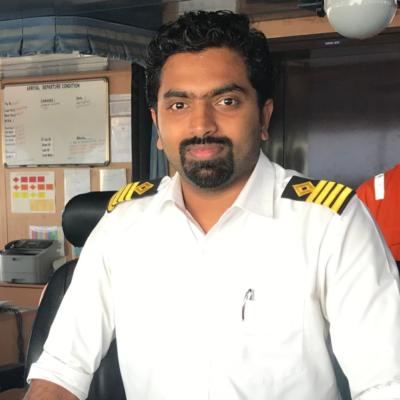Who's navigating? Think ahead: behaving like a 'future Captain'
Sajith Babu AFNI went to sea due to a love of travel and crossing oceans. Here, he talks about what motivated him in the early days of his career and how navigators can encourage those following in their footsteps
What interests you about a career at sea?
I never planned to have a career at sea, but I never had to look back and repent once I was in. My initial reason for pursuing it was my interest in travel and crossing the oceans; visiting various countries and seeing their cultures. I also wanted to go for something different from what others were doing. During the early stages of my career at sea, I learned that the reality was sometimes different. However, thanks to a few of my Masters/ Chief Mates who mentored and guided me along the way, I discovered many of the great avenues and possibilities that a shipping career can offer.

What career path has led you to your current role?
I started off as a Deck Cadet and am now a Marine Superintendent. It has been a wonderful journey. Learning is a continuous process and it is the same when you are at sea. What matters most is how well and how fast you learn. I still remember the first day in my company before joining my first ship, standing in front of my Training Superintendent. “I see you all as future Captains, and I want you to behave like them too”, were his opening words. Golden words which were highly motivational for a starter like me. Completing each and every contract at sea safely and reaching home was always a great achievement. Whenever I came home for vacations for just a couple of weeks, I used to get bored and want to get back onboard. Rules and regulations keep changing and keeping ourselves abreast of these changes is a big task. The Nautical Institute’s immense collection of publications is a great source of reliable information and has been a great help in keeping me updated.
How can experienced navigators help those coming up behind them to improve on their knowledge and skills?
Navigational experience can be broadly classified into two categories. These are ability to use navigational equipment seamlessly and experience in transiting certain congested areas, such as the Singapore Strait, Dover Strait etc., where it is very important to know what could happen over the next hour or so your navigational leg. We should have a proper mix of both to execute a passage safely. Personally, I would suggest that all navigators should be experts on the equipment available to them along with their limitations. Experience in transiting through congested waters is a matter of time. Mentoring junior officers should be positively done through healthy discussions and feedback. Practically implementing what we have learned in college is not that easy, but can be achieved with ample guidance and support. It’s not always necessary to hold formal training sessions, but it is very important to have ice-breaking sessions with the entire bridge team on a regular basis to help build trust.
